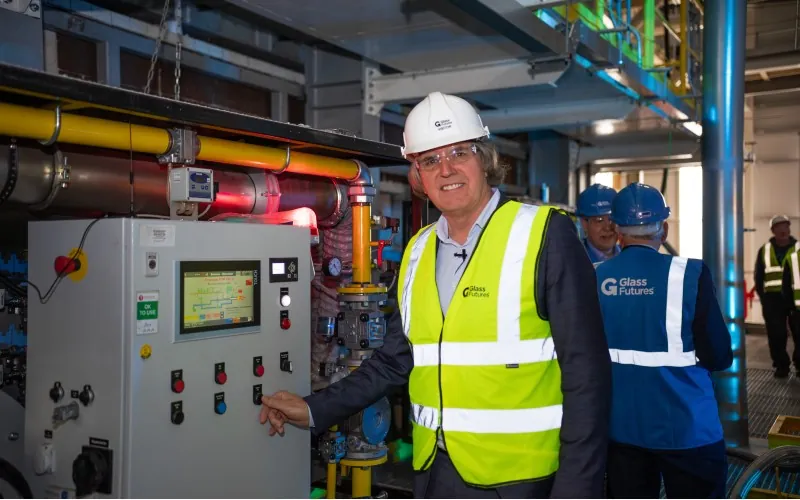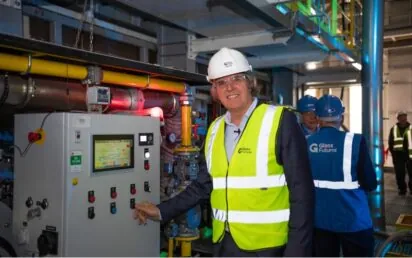Glass Futures has lit its cutting-edge furnace for the first time.
The milestone moment at the £54m Global Centre of Excellence in St Helens heralds the start of international trials aimed at creating sustainable, lower-carbon glass and other materials.
In a dedicated ceremony, Steve Rotheram, Mayor of Liverpool City Region, lit the 30-tonne-a-day furnace putting the town centre stage in the global push for sustainable glass manufacturing.
The furnace is able to use low-carbon fuels including green electricity, hydrogen, and biofuels (such as used cooking oils), reaches temperatures of 1600°C and can produce over 2 miles of flat glass a day – the equivalent of a double decker bus of stacked sheets each week.
“Following the Prime Minister’s visit last month, today marks a defining moment – not just for Glass Futures, our members and St Helens but for the entire global glass and foundation industries,” said Justin Kelly, CEO of Glass Futures Ltd.
“There is no other facility in the world capable of producing both flat (like windows) and container glass (like drinks bottles) using such a wide range of sustainable fuel sources, including electric melting. This isn’t just about decarbonising glass – it’s about working with our membership to transform global manufacturing.
“We were profiled in the government’s Industrial Strategy this week for our work in translating and commercialising new technologies and processes such as using sustainable fuels to develop new materials.
“By hosting trials for manufacturing partners and members from across the UK, Europe and internationally, we’re set to influence production standards worldwide, reducing emissions and supporting other energy intensive sectors like ceramics and steel.”

The pilot line is smaller in size than an industrial production line allowing rapid innovation with results that can be scaled up for industry. Fully automated with Siemens control technology it has high-definition cameras allowing for real-time adjustments to optimise energy use and glass quality.
High-powered electric boosting for the furnace – equivalent to the energy usage in 2000 homes – means it can melt raw materials faster supporting carbon emissions reductions of up to 56 per cent, aligned to British Glass’ Net Zero Glass Strategy.
Groundbreaking robot set to cement place in bricklaying industry
Richard Katz, founder of Glass Futures, said: “Decarbonising global manufacturing is one of the greatest challenges of our time. The foundation industries—glass, ceramics, steel, metals, chemicals, paper, and cement—are vital to modern life, yet they account for around 10% of the UK’s carbon emissions.
“Glass Futures gives manufacturers the space to innovate, test and de-risk new processes away from live production lines. Glass is infinitely recyclable and is one of the best packaging materials so it’s about unlocking sustainable solutions that are scalable and commercially viable.”
Glass Futures has received £9m from the Liverpool City Region Combined Authority.
Rotheram added: “St Helens boasts nearly two centuries of industrial heritage – and today, with the launch of Glass Futures’ furnace, the town is again at the cutting edge of global innovation.
“This centre will become a beacon for the decarbonisation in energy intensive industries – creating clean, green growth that will power our transition to net zero and create high-quality, secure jobs for local people. We’re using our proud industrial past to shape a stronger, more prosperous future for our region – and I can’t wait to see where it leads.”

